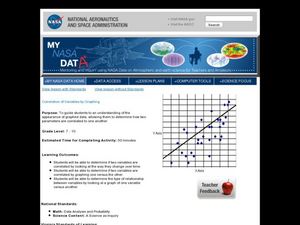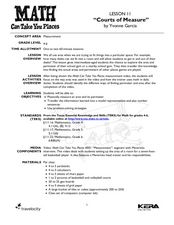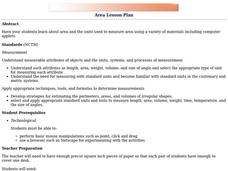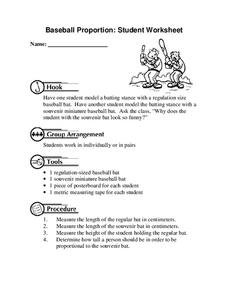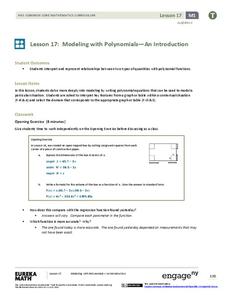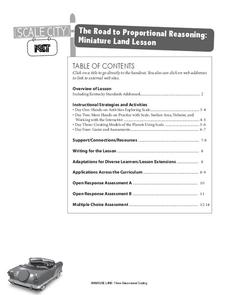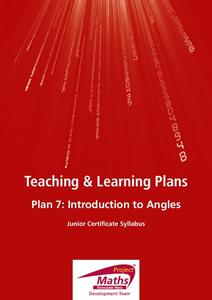Delaware Math Cadre Elementary Committee
Operations and Algebraic Thinking
How to use the relationship between multiplication and division to solve math word problems is the focus of the lesson presented here. In it, fourth graders work in groups to solve problems posed by the teacher. Then, each group is given...
Curated OER
Come Into my Parlor
An interesting cross-curricular lesson on dairy farming awaits your students. Elements of language arts, math, social studies, and agriculture are all present. Many excellent worksheets and a good article on dairy farming are included in...
Curated OER
Basic Excel
Students explore basic Excel spreadsheets. In this spreadsheet lesson plan, students enter Alaska weather information and perform calculations. Students title the columns on the spreadsheet and format the cells. ...
Curated OER
Correlation of Variables by Graphing
Middle and high schoolers use a spreadsheet to graph data. In this graphing lesson, learners determine how two parameters are correlated. They create a scatter plot graph using a computer spreadsheet.
California Academy of Science
Greening Your Middle School
Middle schoolers redesign their school to make it more energy efficient, and create a model of their design. Learners get together in groups of 5, and they take on the task of making their school more energy efficient. To do this, they...
Curated OER
Courts of Measure
Students practice their area and perimeter measurement. In this measurement lesson, students watch a video about perimeter and area. Students measure a gym for perimeter and area. Students write number sentences for the area and...
Curated OER
Measuring in Inches
First graders discover that there are two types of standard measurement using a ruler: centimeters and inches. They use the inches side to measure pipe cleaner "worms"; straigthening them out and laying them on the end of the ruler with...
Curated OER
Area Lesson Plan
Learners explore geometry by using computer applications. For this spatial measurement lesson, students discuss the difference between area, weight, volume and other forms of measurement. Learners utilize computer applications to find...
Curated OER
Baseball Proportion: Student Worksheet
In this mathematics worksheet, learners model a batting stance with a regulation size baseball bat. Then they model the batting stance with a souvenir miniature baseball bat. Students measure the length of each bat in centimeters and use...
Illustrative Mathematics
Finding an Unknown Angle
Teach your class how to apply their knowledge of geometry as they explore the unknown. In order to find an unknown angle, learners must understand that rectangles have four interior right angles, that right angles have 90 degrees, and...
Civil War Trust
Map the Civil War
Mapmaking was a very important element in successfully planning attacks on enemies during the Civil War. Guide pupils through the process of pacing to find the average length of their steps, measure the distance between one object...
University of Colorado
Are All Asteroids' Surfaces the Same Age?
Did you know scientists can tell the age of an asteroid by looking closely at its craters? This final lesson of a six-part series focuses on two asteroids, Gaspra and Ida, in order to demonstrate the concept of dating asteroids. Scholars...
Curated OER
Evergreen Tree
Learners use a ruler to make measurements, and to create triangles and a rectangle. They take the shapes they've made and assemble them into an evergreen tree image. This simple, yet effective, lesson would be ideal for young learners...
EngageNY
Modeling with Polynomials—An Introduction (part 2)
Linear, quadratic, and now cubic functions can model real-life patterns. High schoolers create cubic regression equations to model different scenarios. They then use the regression equations to make predictions.
EngageNY
Comparison Shopping—Unit Price and Related Measurement Conversions II
Which rate is greater and by how much? Pupils continue to compare rates to solve problems in the 20th portion of a 29-part series. Rates are presented in a variety of representations either using the same representation or different...
Kentucky Educational Television
The Road to Proportional Reasoning
Just how big would it really be? Young mathematicians determine if different toys are proportional and if their scale is accurate. They solve problems relating scale along with volume and surface area using manipulatives. The...
EngageNY
Comparison Shopping—Unit Price and Related Measurement Conversions
Speed up your scholars' understanding of ratios. Class members compare ratios related with speeds presented in different representations. They then use the unit rates to make the comparisons.
University of Nottingham
Drawing to Scale: A Garden
See how design and geometry go hand in hand. The activity asks learners to use geometry to design a backyard garden given dimensions of each feature. Scholars work with ratios and scale to develop an accurate scale drawing that includes...
Curated OER
Portrait Proportions and Flesh Tones
Using the provided blank face template, learners of any age draw to learn how to create proper facial proportions. This lesson focuses on two dimensional facial proportions, how to estimate those proportions, and drawing techniques. If...
Curated OER
Arc GIS Project: Visualizing the Holocaust
A cross-curricular lesson for middle schoolers that covers language arts, social studies, geography, and math, this is a great extension activity if your class is reading The Diary of Anne Frank or learning about the Holocaust....
Baylor College
We Need Water
There's nothing quite like a glass of ice-cold, freshly squeezed lemonade. Lesson seven of this series explains how the water humans need to survive can come in many forms. Teach your class about how much water humans require every day...
Project Maths
Introduction to Angles
Approach the lesson from the right angle. A discussion-based lesson leads helps learners understand angles in terms of rotation. Individuals use manipulatives to explore the properties of angles and learn how to name them. The lesson is...
American Statistical Association
A Sweet Task
Candy is always an effective motivator! A fun math activity uses M&M's and Skittles to explore two-way frequency tables and conditional probability. The candy can serve a dual purpose as manipulatives and experimental data.
Illustrative Mathematics
Running on the Football Field
Make your class into Pythagorean theorem fanatics in no time. What a great resource to get your sports enthusiasts into the math game! Read the commentary so you can you can strategize how to apply the three math practices.



